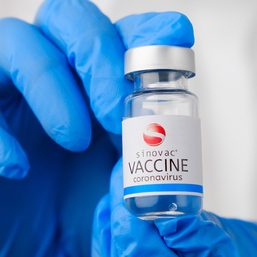SUMMARY
This is AI generated summarization, which may have errors. For context, always refer to the full article.
Philippine manufacturers of personal protective equipment (PPE) urged the government to buy medical-grade masks and coveralls from Filipino companies who produce the prized pandemic items.
The Confederation of Philippine Manufacturers of PPE (CPMP) – a group of 5 electronics and garment manufacturers with decades of experience – made the appeal in a press briefing on Friday, August 21.
The group, composed of Medtecs International Corporation Ltd, EMS Components Assembly Incorporated, Reliance Producers Cooperative, Luen Thai International Group Philippines Incorporated, and Tacca Industries Pty Ltd, came together during the coronavirus pandemic.
They were among the companies that heeded the call of the Department of Trade and Industry (DTI) to produce PPE badly needed by health workers.
Months into the pandemic, however, CPMP said the government – which has the largest demand for PPE – is still mostly importing these items.
“That is why we repurposed – we heeded the call of Secretary [Ramon] Lopez and understand the need of the country…. At the end of the day, it’s not DTI that buys. It’s the DOH that needs it and they buy presently through the PS-DBM (Procurement Services-Department of Budget and Management),” CPMP president Lawrence de los Santos said.
“That’s where we are having issues,” he added.
Ready to supply
As of August, CPMP said that in a single month, the companies are able to provide 57.6 million pieces of medical grade N95, N88, KN95, and surgical masks, as well as 3 million coveralls and gowns and 1.5 million square meters of medical-grade fabric.
The group said the amount produced could easily be doubled or tripled if needed. They added that they are ready to invest $36 million more and hire 4,000 additional workers to increase their production capacity.
De Los Santos said local manufacturers made it a point to secure the necessary certifications along with the Food and Drug Administration’s approval to ensure they produce safe and medical-grade PPE.
But for the PPE industry in the Philippines to grow, CPMP said it is important for the government to buy from Filipino companies.
“Government is so big and can be predictable. It’s something that allows us to scale up production versus supplying private alone, [which] would take longer to scale up,” De Los Santos said.
CPMP vice chairman Perry Ferrer said of the 57.6 million face masks produced monthly, only some 10 million are procured by the government while the rest are exported. De Los Santos said the 3 million coveralls and isolation gowns are mostly sold to hospitals including the Philippine General Hospital and the National Kidney and Transplant Institute.
“We have capacity and we can still produce…. We want to dispel any thinking the manufacturers here cannot supply and that’s why they’re bringing in imports. In reality, we can supply locally manufactured PPE to meet the demand,” Ferrer said.
“We’re not asking for protection, we’re asking for a level playing field,” he added.
Hopes on Bayanihan 2
De Los Santos and Ferrer said CPMP is pinning their hopes on the proposed Bayanihan 2 law to level the playing field for local PPE manufacturers.
The measure that the Senate ratified on August 2 set aside P3 billion for the procurement of PPE for health workers and “other indigent persons,” with preference to be given to local PPE manufacturers.
With health workers still getting infected, the group also questioned whether substandard PPE are being brought into the country.
“Are they being provided the right and the safe kind of PPE that they deserve? We know we can provide that. What is being bought and being provided – do we know or are we sure that these are safe? My point there is it’s a question mark,” De Los Santos said.
Ferrer added: “If after Bayanihan 2, we still cannot see any procurement of support to buy from CPMP, it would be sad. All the cards are there – the best quality, Filipino ‘buy local’ concept, competitive prices…. We didn’t do any shortcuts.”
The DTI, in a statement on Sunday, August 23, said it is now coordinating with CPMP, DOH, and DBM on the possible implementation of Bayanihan 2 if it is passed into law, “as well as on aligning PPE demand requirements, timing of procurement, and flow of production.”
“DTI emphasizes that we have always been pushing for patronizing local manufacturers in sourcing PPE in the government procurement process,” the trade department added. – Rappler.com
Add a comment
How does this make you feel?

![[Rappler’s Best] US does propaganda? Of course.](https://www.rappler.com/tachyon/2024/06/US-does-propaganda-Of-course-june-17-2024.jpg?resize=257%2C257&crop=236px%2C0px%2C720px%2C720px)



There are no comments yet. Add your comment to start the conversation.